I am currently sailing with Greenpeace’s beautiful Esperanza on a ship tour called “Hope in West Africa” to protect the invaluable fishery resources of that region. As part of our investigation and research work in Mauritanian waters, we were searching for fishing vessels and documenting their activities.
As an Oceans Campaigner from Greenpeace East Asia in Beijing, I paid particular attention to the Chinese fishing vessels in Mauritanian waters, many of which have been fishing these waters for decades.
This is my first time sailing in West Africa, and encountering Chinese vessels on the other side of the world made me feel a bit strange. Although I have been researching China’s distant water fishery industry for a while, I always felt I needed more direct experience with Chinese fishermen in the field. I believe communicating with them directly will give me not only more knowledge on the fishery situation per se, but also a better insight of the fishermen’s mentality.
Luckily the opportunity came when we were sailing near Nouakchott, Mauritania. We spotted a Chinese vessel named Fuyuanyu. Esperanza’s Captain Mike gave me permission to try to get on board to talk to the crew.
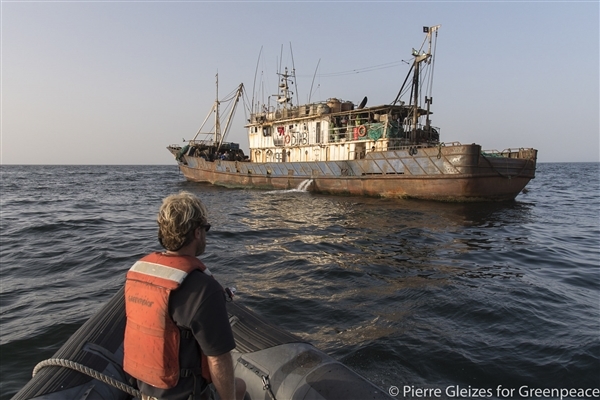
As we were approaching the Fuyuanyu, all the fishing crews stopped working and stared at us. To ease them down, I greeted the Chinese crews in Mandarin and they seemed to be quite surprised and happy to see a new face from China. They talked back and I asked the captain of Fuyuanyu if we could get on board to see what kinds of fish they were catching. Knowing that we were not local fishery authorities, the captain of Fuyuanyu gave us permission to board.
The Chinese captain, named Zheng, became quite candid with us about his satisfaction regarding the catch. Usually, fishing was good and he even told us that “…sometimes we catch too much. The freezers are full of fish and there is no space left for more, so we have to throw away tons of caught fish.” As it takes up to 3-4 hours to sort out the caught fish, it means that by the end of the process, the unwanted species will be dead. West African waters are already severely depleted and the fish stocks are shrinking year by year: it was just heartbreaking to imagine tons of fish caught and thrown back to the sea, dead.
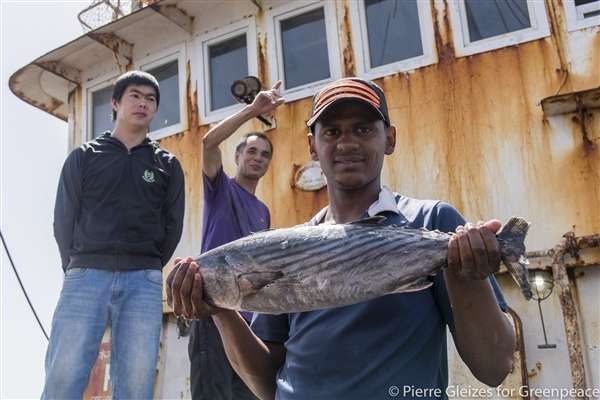
It was midday, and due to strong sunlight, most of their target fishes were not active near the surface of the sea. We were thus told that no fishing activity would happen for a while. However, the captain offered us another opportunity to visit the ship again after sunset to watch the whole process of catching fish.
At around 6pm, we contacted Captain Zheng via radio to confirm we still had his permission to get on board. Our photographer, videographer and myself left with an inflatable and once again boarded the Fuyuanyu. The Chinese captain warned me before that if we wanted to record the whole fishing process, we would have to stay on his ship until midnight – which meant spending almost 6 hours on Fuyuanyu.
Considering that this was a priceless chance to document a full set of fishing activity and to interview a Chinese fishing captain, we decided to stay.
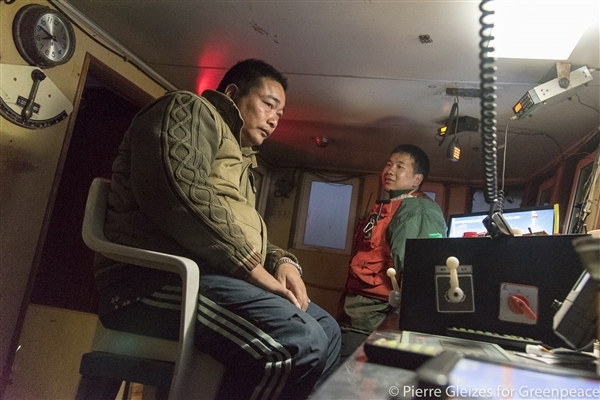
After the crew put the fishing gears into the water, we went to captain Zheng’s cabin and started the 4 hour process of waiting. We talked a lot about his crew, ship, company, and even his family. He told us that on the 20 crew members on board, half of them were Chinese and half of them from Mauritania. Most of the Chinese crew has been away from home for nearly 2 years. Aside from work, the two groups of crew barely talk to each other, and they live in separate rooms. The Captain confessed he was obliged to hire them because of the agreement the company had with the government (more on the life on board a Chinese fishing vessel in West Africa).
One thing I found was very interesting during our conversation was that even he, a Chinese fishing vessel captain, knows how destructive the nowadays industrial fishing vessels are.
He said straight to our camera, seeming a bit proud that “Wherever we sail, there will be no fish left in the ocean.”
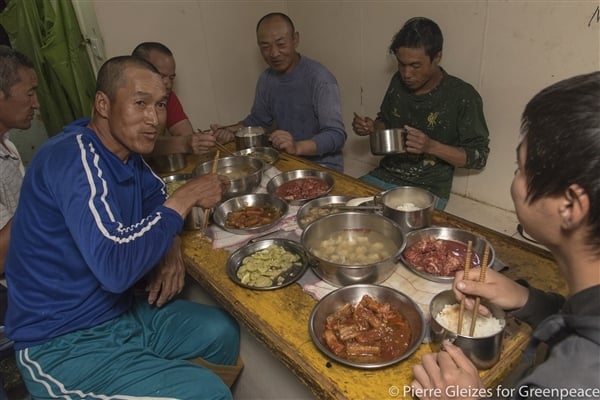
As we were leaving Fuyuanyu that night, the captain was just ordering his crews to sort out two huge bags of newly caught fish which already took nearly all the space on the deck, and there were still three more big bags of fish in the water that were awaiting to be collected. Looking at the mountain of fish on the deck, I could not stop wondering.
Besides the Chinese vessels, there are hundreds of other foreign vessels fishing in West African waters as well. Do their crews share same opinions with Chinese captain Zheng?
How much destruction have they made to fishery resources in the region? And without proper management plan by the local authorities, how long can the West African fishery resource sustain such fishing efforts?
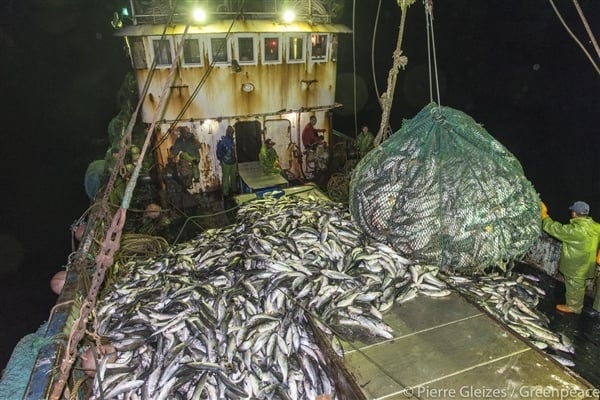
Bolei Liu is an Oceans Campaigner at Greenpeace East Asia
